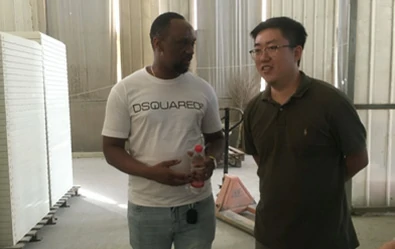loading...
- No. 9, Xingyuan South Street, Dongwaihuan Road, Zaoqiang County, Hengshui, Hebei, China
- admin@zjcomposites.com
- +86 15097380338
- Welcome to visit our website!
frp pressure vessel
Understanding FRP Pressure Vessels Advantages and Applications
Fiber Reinforced Polymer (FRP) pressure vessels have gained significant momentum in various industries due to their unique properties and benefits over traditional materials like steel and aluminum. These advanced composite materials combine high strength and durability with excellent resistance to corrosion, making them ideal for a wide range of applications including chemical storage, water treatment, and gas containment.
What is FRP?
FRP is a composite material made from a polymer matrix reinforced with fibers, such as glass, carbon, or aramid. The fibers provide strength and rigidity, while the polymer matrix offers flexibility and resistance to environmental factors. This combination results in a lightweight, strong, and durable material that can effectively withstand high pressures and harsh conditions.
Benefits of FRP Pressure Vessels
1. Corrosion Resistance One of the greatest advantages of FRP pressure vessels is their superior resistance to chemical corrosion. Unlike traditional metallic vessels that can corrode over time when exposed to harsh chemicals, FRP vessels maintain their integrity and functionality, reducing maintenance costs and increasing longevity.
2. Lightweight FRP materials are significantly lighter than metal counterparts. This reduces the overall weight of the pressure vessels, making installation and transportation easier and more cost-effective. The reduction in weight can also lead to lower structural support requirements, further enhancing cost savings.
3. High Strength-to-Weight Ratio Despite being lightweight, FRP offers an excellent strength-to-weight ratio. This means that FRP pressure vessels can handle significant internal pressures without compromising safety or structural integrity, making them suitable for high-pressure applications.
4. Thermal Insulation FRP possesses excellent insulating properties, which can help maintain the desired temperature of the fluids contained within the vessels. This is particularly advantageous in applications where temperature control is crucial.
5. Versatility FRP can be designed and manufactured in various shapes and sizes, making it highly versatile. Whether it’s for custom applications in chemical processing plants or standard designs for water treatment facilities, FRP pressure vessels can be tailored to meet specific requirements.
frp pressure vessel

Applications of FRP Pressure Vessels
FRP pressure vessels are utilized across a wide range of industries due to their numerous advantages. Here are some key applications
1. Chemical Processing In the chemical industry, FRP vessels are commonly used for storing and transporting corrosive materials. Their resistance to chemical attacks ensures the safe containment of hazardous substances.
2. Water Treatment Water treatment facilities benefit from FRP pressure vessels for processes such as filtration, storage, and chemical dosing. The corrosion resistance of FRP makes it an ideal choice for treating aggressive chemicals used in disinfection and purification.
3. Oil and Gas The oil and gas industry employs FRP pressure vessels for various applications including pipeline systems, separators, and storage tanks. Their lightweight and durable nature allows for efficient handling and increased safety in challenging environments.
4. Food and Beverage The food industry utilizes FRP vessels for storing and processing food-grade materials. The non-reactive nature of FRP ensures that no chemicals leach into the food, maintaining product safety and quality.
5. Aerospace and Automotive In aerospace and automotive applications, the lightweight properties of FRP are highly desirable. Pressure vessels crafted from FRP are used in various components, contributing to overall weight reduction and improved fuel efficiency.
Conclusion
FRP pressure vessels represent a significant advancement in pressure vessel technology. Their combination of lightweight, high strength, corrosion resistance, and thermal insulation makes them an attractive option for various industries. As more companies recognize the benefits of using FRP materials, the demand for these innovative pressure vessels is likely to continue growing, paving the way for safer, more efficient, and cost-effective solutions in pressure containment. The future indeed looks bright for FRP in the world of engineering and industrial applications.
-
GRP Structures: The Future of Lightweight, High-Performance EngineeringNewsJun.20,2025
-
FRP Water Tank: High-Performance Storage for Corrosive and Clean Water SystemsNewsJun.20,2025
-
FRP Square Tube: The New Industry Standard for Chemical and Structural ApplicationsNewsJun.20,2025
-
FRP Pultruded Profiles: The Ultimate Choice for Lightweight Structural StrengthNewsJun.20,2025
-
FRP Handrails: The Safer, Smarter, and Stronger Choice for Modern InfrastructureNewsJun.20,2025
-
FRP Grating: The Smart Solution for Durable, Lightweight Industrial FlooringNewsJun.20,2025
-
Why Choose a Galvanized Water Tank for Your Storage NeedsNewsMay.21,2025
